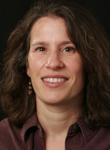Where Harry met Sally matters more than when
By H. Roger Segelken

That dependable conversation starter – “Tell us where the two of you first met” – can yield a surprising range of stories.
Researchers at Cornell and the University of Indianapolis heard 62 revealing, romantic, heartfelt accounts from working-class and middle-class couples they interviewed. And a few “cover stories” from those reluctant to tell how they really met.
“Our research provides tantalizing hints that diverging destinies may begin at point of meeting – and that locations where individuals meet romantic partners influence the composition and perceived extent of their network of support,” wrote Cornell’s Sharon Sassler and U of I’s Amanda Jayne Miller in a recently published journal report.
Says Sassler, professor of policy analysis and management in the College of Human Ecology at Cornell: “Perceptions of what others think are socially acceptable ways and places to meet have a lot to do with it. If you met at a bar or an online dating site, you might think peers and parents won’t approve and be supportive of your relationship – and you might be right.
“Whereas, if you meet where there’s a supportive social network,” Sassler adds, citing the workplace, for example, or a college class, “you receive encouragement to continue and deepen the relationship – especially when friends or colleagues say: ‘We knew you guys were right for each other.’”
Paging Nora Ephron
Which of these how-we-met stories, from the Sassler-Miller “Ecology of Relationships” report, would you pitch for the next “Sleepless in Seattle”?
• “Everyone was telling me how great Internet dating was, that it’s easier to get rejected, 'cause you can just delete the email and go to whoever is next.”
• “I always said I never wanted to pick up a guy at a bar, but I kind of did.”
“We have a very scandalous relationship. She was actually the internship coordinator and my boss.”
• “He had a cute butt, and I said something to my mom, and she said something to my RA, and he introduced us later that night. And we just, from that night on, we never spent a day apart.”
Too late, Sassler and Miller already have a film option on this one, in their words:
• "Randy, a 35-year-old mechanic, met Ming when he came into the restaurant where she was a cashier, in search of hot soup to cure a bad cold. Because she seemed solicitous for his health, he came back when he felt better to ask her out.”
Then there’s “Jerry,” a 27-year-old store manager who met “Natalie” in an online chat room. “We say we met at a party at Ohio State, which neither one of us went to, so it gets kind of confusing.”
Confusing, indeed.
Except to the researchers, who were able to make sense of all the stories before writing their report, “The ecology of relationships: Meeting locations and cohabitors’ relationship perceptions,” published online in March 2014 at the Journal of Social and Personal Relationships.
Study subjects were unmarried, heterosexual couples, between 18 and 36 years of age, living together in and around Columbus, Ohio. Some had met through friends and family, like “Alisha,” who recalled: “We would hang out, and I would talk to ‘Jared’ more than anybody else, regardless that my best friend told me that he was the guy I was going to end up marrying. I didn’t listen.”
Not quite Nora Ephron material (see sidebar) but couples who met while pursuing common interests had compelling stories. Like “Dawn,” a working-class clerk who met her current cohabitant “like I meet all my boyfriends, playing basketball.” Commented the researchers, “These respondents suggested that their shared interest provides insight into the kind of person their partners were.”
Others had met at school or college, at work or at bars of various kinds, the researchers learned, reporting a kind of PBR (Pabst Blue Ribbon) Effect: “The bars where the working class met were often described as ‘dives,’ whereas the high-end pubs where several of the college-educated couples met featured craft brews costing more than entire cases of cheap beer.” Middle-class meeting venues, the researchers noted, “provide various filters – affiliation, affordability – that may signal a prospective partner’s future prospects.”
Among couples who met online, computer repairman “Artie” told friends and family he met “Brandi” in the workplace. “Artie’s comments highlight the concern that others – especially family members – will not approve of a way of meeting devoid of social communal oversight,” the researchers observed.
“Those who met through ‘traditional’ ways – via friends and/or family members – received more social support,” Sassler notes. “Their relationships were, in essence, sanctioned to continue on. And more of these couples got engaged and were planning weddings (often with economic support from parents) than those who met in more anonymous settings, like via the Internet.”
Media Contact
Get Cornell news delivered right to your inbox.
Subscribe